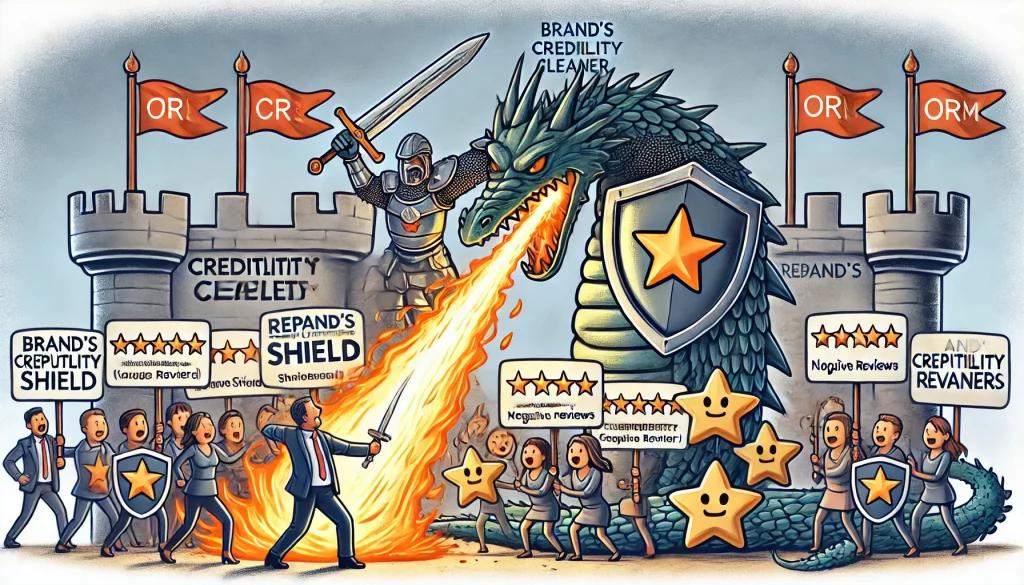Online reputation management (ORM) tools: Boost your brand’s credibility

Online reputation management (ORM) is the strategic practice of crafting and influencing the public perception of a brand or individual on the internet. In today’s digital age, where businesses are increasingly dependent on their online presence, the significance of robust ORM is paramount.
Despite its importance, evaluating the effectiveness of ORM initiatives presents unique challenges. This guide offers insights into assessing the performance of your ORM tools and strategies, ensuring they align with your business objectives.
Key metrics for measuring ORM success
Review metrics
Review metrics are vital for assessing your online stature. Regularly monitor the volume of reviews across various platforms. An increase in review counts can signal enhanced online visibility.
Besides quantity, quality is critical; track improvements in star ratings and observe the diversification in review sources—a sign of expanding online reach.
Customer acquisition metrics
ORM success directly influences customer engagement. Monitor the surge in customer inquiries and pinpoint their origins.
A rise in online queries often reflects effective ORM. Additionally, observing conversion rates can reveal if a positive online reputation is converting into actual sales.
Social media metrics
Engagement on social media platforms is a direct reflection of brand perception. Measure metrics such as likes, shares, and comments.
Track follower increments and employ sentiment analysis tools to assess the general sentiment surrounding your brand mentions.
Search engine visibility
A well-managed ORM strategy often leads to improved search engine rankings. Monitor your rankings for essential search terms over time, with a special focus on local SEO, which is crucial for many businesses.
Website traffic metrics
Analyze the growth in your website traffic, a reliable indicator of rising online interest. Examine traffic origins to determine which platforms are funneling traffic to your site, and assess user interaction to gauge how reputation enhancements impact behavior.
Brand sentiment analysis
Deploy sentiment analysis tools to get an overarching view of your brand’s perception. Comparing sentiments across various platforms can highlight potential areas for improvement.

Tools for tracking ORM effectiveness
Leverage various tools to gauge and enhance your ORM effectiveness:
Review monitoring: Platforms like Trustpilot and Yotpo.
Social media analytics: Tools such as Hootsuite or Sprout Social.
SEO tracking: Solutions like SEMrush or Ahrefs.
Web analytics: Google Analytics offers a comprehensive, free tool to analyze traffic and user behavior.
Interpreting ORM data for business insights
Systematic analysis of ORM data can unearth valuable business insights. Identify trends and patterns over time, conduct competitive analyses to benchmark your performance, and utilize customer feedback to uncover preferences and pain points.

Common challenges in measuring ORM effectiveness
Isolating ORM impact
Differentiating the effects of ORM from other marketing strategies can be complex. Consider controlled experiments or time-series analysis for clearer insights.
Handling fake reviews
Counteract fake reviews and bot interactions that can distort data. Implement stringent detection mechanisms and regularly review your social interactions.
Balancing impact analysis
ORM efforts often yield long-term results. Maintain a balance between short-term metrics and long-term trends for a comprehensive understanding.
Attribution challenges
Pinpointing which ORM activities drive specific outcomes can be tricky. Employ multi-touch attribution models for greater accuracy.
Data inconsistency
Different platforms may offer varying data details. Create a standardized framework for consistent analysis across all channels.
Best practices for ongoing ORM evaluation
Baseline metrics: Establish and maintain clear baseline metrics before rolling out new ORM strategies for effective progress tracking.
Regular reporting: Implement a routine schedule for ORM metric analysis to stay abreast of trends and adapt strategies promptly.
Strategy adjustments: Continuously refine your strategies based on analytical insights and be agile in pivoting approaches as needed.
Data integration: Merge data from multiple sources for a well-rounded view of your online reputation.
Competitive benchmarking: Regularly evaluate your ORM performance against competitors to contextualize your standing and identify improvement areas.
Cross-functional collaboration: Engage various departments in ORM evaluation for more comprehensive insights and strategies.
Adapt to evolve: Keep abreast of new ORM tools and best practices as the digital landscape evolves.

Expert opinions on online reputation management (ORM) tools
Dr. Emily Carter, Chief Digital Strategist at Nexa Insights “Online Reputation Management (ORM) tools are essential for thriving in the digital age, providing crucial features like real-time monitoring and sentiment analysis. These tools help businesses swiftly address negative feedback and leverage positive reviews through AI-driven insights. The ability to adapt these tools to new digital platforms will be vital for continued success.”
Michael Thompson, Founder and CEO of BrandGuard Solutions “ORM tools have dramatically transformed public image management, evolving from simple review monitoring to advanced analytics and competitive benchmarking. These tools allow businesses to anticipate reputation issues and understand their market position, with machine learning enhancing risk prediction and mitigation. Such capabilities make ORM tools indispensable for any brand.”
Laura Bennett, Head of Marketing at RepuTrek “Effective ORM goes beyond monitoring mentions, requiring strategic actions based on comprehensive data analysis. The best tools track and analyze reviews, providing actionable recommendations for managing both positive and negative feedback. A holistic approach to ORM offers a complete view of a brand’s online presence, guiding effective strategies.”

 5 min
5 min 







